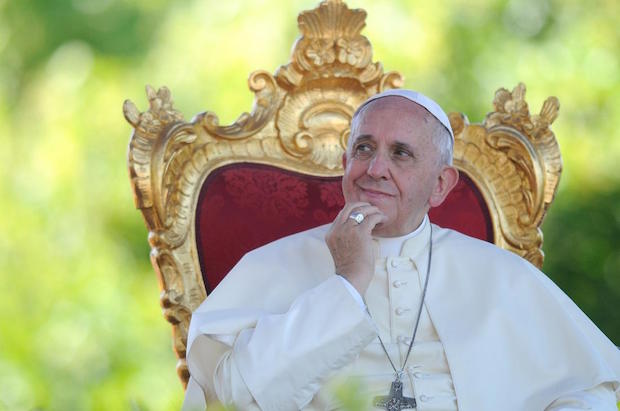Pope Francis, unpredictable as ever, has just announced that during the forthcoming ‘Year of Mercy’, Catholics can receive absolution from priests of the ultra-traditionalist Society of St Pius X (SSPX), which has illicitly ordained its own bishops and doesn’t recognise the Second Vatican Council.
He’s also given all priests permission to absolve anyone who truly repents of the sin of having or procuring an abortion – which they could already, though they might need the permission of the local bishop since it incurs automatic excommunication. So this isn’t such big news.
Archbishop Marcel Lefebvre (1905-91) was the arch-reactionary who, defying Pope John Paul II, ordained four bishops including the Holocaust-denying nutjob Richard Williamson, thus getting himself and them excommunicated. Pope Benedict XVI lifted the excommunications on Williamson and the other three in 2009. This wasn’t a smart move, since it earned him shocking publicity and the Lefebvrists offered nothing in return. They’re like that.
Now Francis, out of the blue, has written the following to Archbishop Rino Fisichella, President of the Pontifical Council for the Promotion of the New Evangelisation:
A final consideration concerns those faithful who for various reasons choose to attend churches officiated by priests of the Fraternity [Society] of St Pius X. This Jubilee Year of Mercy excludes no one. From various quarters, several Brother Bishops have told me of their good faith and sacramental practice, combined however with an uneasy situation from the pastoral standpoint. I trust that in the near future solutions may be found to recover full communion with the priests and superiors of the Fraternity. In the meantime, motivated by the need to respond to the good of these faithful, through my own disposition, I establish that those who during the Holy Year of Mercy approach these priests of the Fraternity of St Pius X to celebrate the Sacrament of Reconciliation shall validly and licitly receive the absolution of their sins.
This is very surprising news, though difficult to interpret because the precise status of the SSPX is not clear. It isn’t officially schismatic, but on the other hand Catholics aren’t supposed to attend its Masses or enter its confession boxes. If I go into any more detail I’ll just invite the usual bellyaching from commenters below asking why Spectator readers should be interested in ‘Roman Catholics’. The traddie blogger Father Z has published a useful post on the subject here. He speculates that, just as it took the veteran anti-communist Richard Nixon to do a deal with China, so the liberal Francis could bring the SSPX back into the main body of the Church.
I can’t see that happening. Many ordinary Catholics are worried by Francis’s apparent willingness to countenance a softening of the Church’s line on divorce and homosexuality. I seriously doubt whether many Lefebvrists recognise him as the real Pope. In theory, the ‘full communion’ to which Francis refers shouldn’t be beyond reach: Rome recognises the orders of SSPX clergy, which it doesn’t in the case of Anglicans. In practice, the SSPX enjoy not being full members of the post-Vatican II Church – which is why every time a big concession is made, such as the restoration of the old Latin liturgy, they move the goalposts. Personally I would rather they were out than in, especially the French lot. I prefer my incense without a whiff of Vichy. (The only point in their favour is that they don’t stage grisly ‘folk Masses’; I nearly apostatised after attending one on Sunday.)
So, what was the point of Pope Francis’s gesture? Perhaps he takes pleasure in wrong-footing the SSPX: they won’t enjoy being told that, for one year only, Catholics can hear confession from their priests with a clear conscience. Perhaps he’s making the point that God’s mercy does not discriminate, and that ultra-traddies who loathe him are as deserving of it as anyone. This being Jorge Bergoglio, the most hard-to-read pontiff for centuries, one possibility doesn’t rule out the other.







Comments